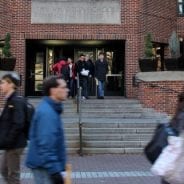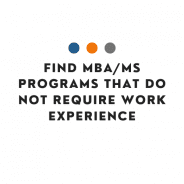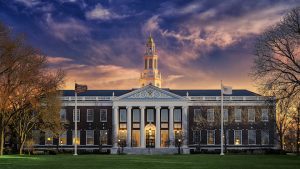Search results for yale som:
School v. School: Arizona State W.P. Carey vs. Arizona Eller
The Grand Canyon State offers two attractive MBA programs tailored to professionals looking to expand their career horizons.
Arizona State University in Tempe, just outside of Phoenix, and the University of Arizona in Tucson, 60 miles from the Mexican border, are both large public universities with renowned business schools. Each program has unique strengths depending on what prospective b-schoolers are ultimately hoping to get out of their business school experience.
We take a look at the two largest business schools in the state of Arizona in our most recent School v. School comparison, analyzing Arizona vs Arizona State.
Where Should You Go? The Benefits of a Mid-Tier MBA
You have an MBA acceptance letter from both Harvard Business School and Cornell SC Johnson. Which do you choose?
Your gut reaction might be to choose Harvard’s top-ranked MBA program without a second’s pause. After all, aren’t business school rankings—like those compiled by the Financial Times and U.S. News & World Report—the most important consideration when choosing your MBA program?
In some cases, you might be right. If you’re most interested in reputation, then ranking is all important. However, there are many times when rankings should be taken with a grain of salt. They tell a story, but not the whole story, especially when it comes to you as an individual candidate.
Just because a specific school is top-ranked, does not mean it should be the top rank for you. Many mid-level MBA programs are just as impressive and could be a better fit for you depending on your needs.
In this article, we’ll take an in-depth look at when and why you should choose a mid-ranked MBA program over a top-ranked program. Continue reading…
The College Admissions Scandal—Could it Happen with MBA Programs?
Earlier this month, dozens of people—including celebrities Lori Laughlin, William H. Macy, Felicity Huffman, and Mossimo Giannulli—were caught greasing the wheels in a major college admissions scandal. Parents funneled a combined total of $25 million through a college admissions consultant, William “Rick” Singer, to athletic coaches and test proctors, all with the aim of gaining admission for their children to an elite undergrad program. Undergraduate programs entangled in the scandal included Stanford University, the University of Southern California, Wake Forest University, Georgetown University, Yale University and others.
Singer organized the bribery through his admissions consulting operation and a phony non-profit called Key Worldwide Foundation. In exchange for payment, the exam proctors would give students more time for the SATs and ACTs, provide answers and even allow substitute test takers. Meanwhile, athletic coaches would push candidates as recruits at their institution, whether or not they even had athletic experience.

Full House actress Lori Laughlin (left) was one of the major names caught in “Operation Varsity Blues,” paying an alleged $500,000 bribery to get her daughters Olivia Jade (center) and Isabella Rose (right) gain admission to USC / Photo via Gabriel Olsen/Getty Images
“Operation Varsity Blues,” as the FBI has nicknamed the investigation, exposed weaknesses in the college admissions process and demonstrated the shocking lengths that some parents will go to in securing a brand name education for their children.
We’ve seen the pressure and the hope of gaining admission to a top business school—so what’s to prevent fellow MBA applicants from gaming the system? Clear Admit believes there are several key differences in the MBA application space that make the “Operation Varsity Blues” type of scandal less likely.
- GMAC Runs a Tight Ship
The Graduate Management Admissions Council (GMAC) owns the GMAT exam, a test required by a majority of leading business schools for admission. The test is only offered via computer, making it harder to bribe a proctor for extra exam time. It also features strict identity security—including palm scanning—that thwarts any attempt of substitution of the test taker. Fraudulent attempts to increase GMAT scores have happened in the past, but GMAC has been swift in taking appropriate measures to avoid future threats to the integrity of the test. For instance, GMAC explicitly chose Pearson as the designated administer of the exam in 2006 due to the firm’s track record in testing security and anti-fraud measures. - Without Sports, There are No Coaches to Bribe
There are no formal athletic programs in graduate business programs. Unlike for the undergraduate scandal, the space for which one would pay simply does not exist. - Integrity Matters, and AIGAC Helps
The Association of International Graduate Admissions Consultants (AIGAC) released a statement upon news of the undergraduate admissions scandal: “AIGAC was established with the express purpose of setting high ethical standards in the graduate admissions consulting industry…AIGAC exists to provide support and professional development for those helping young people self-reflect through the admissions process and attain the right education in the right way.” Scott Shrum, former President and COO of Veritas Prep and current Secretary of AIGAC, added, “One of the most important things AIGAC does is keep the lines of communication open between the admissions consulting industry and administrators at schools. The more the admissions process seems murky to applicants, the more room that shady operators have to operate in the twilight and promise things that they really shouldn’t be promising. The more transparent the process is, the less room there is for that sort of behavior, and AIGAC has helped schools find allies in the industry who also want more transparency. A good admissions coach helps an applicant see the process more clearly and approach it with more confidence, and I credit AIGAC and the schools for helping to make that situation better over the past decade.” - Admissions Consultants Offer Advice On How to Put Your Best Foot Forward, Not Tips to Cheat the System
Shrum also notes, “The journalists who conflate legitimate coaching with this scandal are either deliberately doing it or are missing the point. That’s like saying that hiring a tennis coach and giving your kid steroids are both ways to help your child do better in a tournament, so they must not be very different. While this scandal has rightly shed more light on the college admissions game, Rick Singer and his cronies weren’t admissions counselors. They were crooks.” - Applicants are in the Driver’s Seat
Clear Admit co-founder, Graham Richmond, shared the following observation, “Helicopter parents are much more likely to be present in undergraduate admissions. By the time young people turn their attention to the MBA, they are usually the ones driving the process (and NOT their parents) and therefore, there is far less likelihood of fraud.” - Sooner or Later, the Truth Will Come Out
Shrum also offered this perspective, “I think it would be naive to think [such a scandal] can’t happen in MBA admissions. In the test prep space, the Scoretop scandal from 2008 showed the lengths that people will go to in an effort to boost their GMAT scores. On the admissions side, it’s inevitable that an applicant from a well-connected family, or whose boss is a huge donor to a school, has a leg up in the process. As long as universities value fundraising, I think this will always be the case. With all that said, however, it’s important to keep in mind that business school classes tend to be much smaller than undergraduate colleges, so it’s much tougher to ‘hide’ a mediocre applicant in a class. But it surely happens.”
While the system itself clearly has several safeguards against fraud, Shrum left us with a dose of reality:
“Unethical clients and unscrupulous admissions consultants find each other. It’s rare that an innocent family gets steered into bribery by an unethical consultant, or vice versa. They know what they’re up to, and what/whom to look for. I can’t count the number of times an applicant or parent has asked me, ‘So you’ll write the essays for us, right?’ and when I explain that’s not how it works, they move on. In some cases, I’m sure they find an admissions consultant who will do just that for them. Both parties know that what they’re doing is wrong, but they seem to have no problem doing it.”
The view at Clear Admit is that what happened in the “Operation Varsity Blues” case is clearly repugnant and unethical. It is also sad and a little puzzling.
Richmond offered the following thoughts: “On some level, this shouldn’t be shocking; it’s certainly not the first time we’ve seen people have ethical lapses when they can line their own pockets with money. But what sticks with me is the role that the parents played. These parents—who are presumably well educated and could have theoretically provided a great environment for their children to become smart young people and get into great schools on their own merit—felt the need to cheat. I wonder if they were perhaps too busy with their careers and not bothering to parent (resulting in kids who weren’t motivated enough) … or if they were somehow led to believe that this is how the college admissions game is played. Or perhaps it was just a case of them desperately wanting to be able to brag about the success of their children at cocktail parties? In all cases, it’s just profoundly sad.”
This article on the recent college admissions scandal has been edited and republished with permissions from its original source, Clear Admit.
Wharton Takes Over Top Spot on New U.S. News MBA Ranking
Harvard loses its crown, Wharton ranks first, and Purdue stumbles in new U.S. News & World Report “Best Business Schools” ranking.
The annual U.S. News & World Report Best Business Schools ranking, largely regarded as the most prominent MBA ranking system in the United States, debuted its newest annual listing, with The University of Pennsylvania’s Wharton School taking the top mantle.
The Philadelphia metro business school ascends past Harvard Business School and the University of Chicago Booth School of Business—both tying for first last year. Both schools took a minor tumble to the third overall spot, sitting in a three-way tie with the MIT Sloan School of Management. Stanford’s Graduate School of Business lept into the second overall spot, which comes just a few months after the Silicon Valley school maintained its status as the best in the world according to the Financial Times.
U.S. News & World Report Top 10 Business Schools
| School | This Year's Ranking | Last Year's Ranking |
|---|---|---|
| Wharton (University of Pennsylvania) | 1 | 3 |
| Stanford Graduate School of Business | 2 | 4 |
| Harvard Business School | 3 (tie) | 1 (tie) |
| Booth (University of Chicago) | 3 (tie) | 1 (tie) |
| Sloan (Massachusetts Institute of Technology) | 3 (tie) | 5 |
| Columbia Business School | 6 (tie) | 9 |
| Kellogg (Northwestern University) | 6 (tie) | 6 |
| Haas (UC Berkeley) | 6 (tie) | 7 (tie) |
| Yale School of Management | 9 | 11 (tie) |
| Fuqua (Duke University) | 10 | 11 (tie) |
Within the top 50 business schools, this year’s ranking largely resembles last year’s. In fact, only three business schools—the University of Pittsburgh Joseph M. Katz Graduate School of Business, the Iowa State University Ivy College of Business, and the The Manderson Graduate School of Business at the University of Alabama—moved into the top 50 since last year. The three business schools to fall out of the top 50 were Rutgers Business School, the Haslam College of Business at The University of Tennessee, Knoxville, and the University of Utah David Eccles School of Business. All three moved down the ranking by at least 10 spots each.
U.S. News Ranking Rising Business Schools
No school saw a better year-end turnaround than the aforementioned Iowa State University Ivy College of Business. The Midwest business school moves from the 79th spot last year to 47th this year; a 32-spot increase. On the news of the new ranking, Dean David Spalding says in a press release, “This significant rise in the ranking is a direct result of the quality work our faculty do every day in the classroom. At a time when some universities are dropping their full-time MBA programs, the Ivy MBA continues to excel. Our internationally known faculty provide a top-notch MBA experience that helps our MBA graduates advance their careers to the next level.”

Iowa State University’s Ivy College of Business earns the biggest ranking bump from U.S. News this year, moving up 32 spots from last year.
Ten schools in the top 100 saw double-digit rankings jumps, with Iowa State accruing the greatest increase. The University of Kentucky Gatton College of Business and Economics, the Oklahoma State University Spears School of Business, and the Babson College F.W. Olin Graduate School of Business all saw a rise of at least 20 spots this year as well.
Purdue, Case Western Stumble
On the opposite end of this year’s ranking is Purdue University’s Krannert School of Management, falling a total of 21 spots from 53rd last year to 74th this year. The University of Kansas School of Business and the Saunders College of Business at RIT join Krannert as this year’s three biggest falling schools, each dropping at least 20 spots respectively. Like most of the annual U.S. News rankings, the placement fluctuation is much more apparent the further and further down the list you go, with schools in the top 50 largely remaining stable.
U.S. News 2020 Ranking Methodology
To formulate its ranking, U.S. News & World Report analyzed “475 MBA programs accredited by the Association to Advance Collegiate Schools of Business International.” A total of 367 schools responded to its surveys, but only 131 schools made the final ranking “because they provided enough of the required data on their full-time MBA program that were needed to calculate the full-time MBA rankings, based on a weighted average of the indicators.” Those indicators, with the weighted values, are as follows:
Quality Assessment (0.40)
• Peer assessment score (0.25)
• Recruiter assessment score (0.15)
Placement Success (0.35)
• Mean starting salary and bonus (0.14)
• Employment rates for full-time MBA program graduates
Student Selectivity (0.25)
• Mean GMAT and GRE scores (0.1625)
• Mean undergraduate GPA (0.075)
• Acceptance rate (0.0125)
Did The Methodology Changes Affect This Year’s U.S. News Ranking?
Last September, calls for changes in the MBA ranking methodology seemed to be answered by several large publications, including U.S. News. The company’s Chief Data Strategist, Robert Morse, noted, “There is an active and ongoing debate about how to best measure quality in education, and we pay close attention to that debate. Over time, our ranking model has put more emphasis on outcomes measures … As part of this evolving process, we’ve wanted to measure whether schools were successful at serving all of their students, regardless of economic status.”
The overarching issue seemed to lie within a framework that continually rewarded students and business schools that actively enrolled more and more students from affluent families. In response, U.S. News decreased its ranking value of acceptance rates, which previously rewarded schools that were more selective. Now, as seen above, the weighted value of acceptance rates is less than 1 percent.
However, the changes in the formula did not seem to bare much tenable change in the outcomes. The top 50 schools were largely unchanged, with only minor variances. Several schools, such as Iowa State and Oklahoma State were handsomely rewarded in the new ranking, moving up at least 20 spots each. However, schools rising and falling by 10, 20, even 30 spots in a given year isn’t a new occurrence. In fact, last year, nine schools in the top 100 rose at least 10 rankings from the previous year.
Stay tuned to MetroMBA for more information and analysis of this year’s MBA rankings.
The Twitter Echo Chamber (Sort Of), and More – Boston News
Let’s explore some of the most interesting stories that have emerged from Boston business schools this week.
Here’s Why Twitter Isn’t the Echo Chamber You Think It Is – Questrom School of Business News
In new research recently published in MIS Quarterly, Northeastern Questrom’s Jesse Shore and Chrysanthos Dellarocas with Hong Kong University of Science and Technology’s Jiye Baek (Questrom, Ph.D. ’18) found that Twitter users tend to “post more moderate content” than the content to which they are exposed.
Shore explains that this finding stands in stark contrast to the theory that the platform “opens us up to a greater diversity of perspectives, nudges us to ever-more extreme positions,” and creates an echo chamber for opinions.
“I hope this study helps move the public conversation beyond the notion of echo chambers. In many ways Twitter users are the opposite of the way they are described in the press: they are exposed to diverse information, but post more moderately,” Shore says.
You can read more about the research here.
How ‘Credibility-Enhancing Displays’ Can Boost Sales and Drive People to Action – MIT Sloan Ideas Made to Matter
MIT Sloan Associate Professor of Management Science and Brain and Cognitive Sciences David Rand and Yale doctoral candidate Gordon Kraft-Todd pursued new research that suggests that businesses will inspire potential customers to engage their services if they “walk the walk” since “beliefs are spread more effectively by actions than by words because actions reveal information about the actor’s true beliefs.”
Kraft-Todd explains:
“This is true of solar panels, but it’s true of any campaign where the common denominator is some new or rare behavior. If practitioners organize a campaign around a novel technology or practice, then the first thing they should do is get spokespeople and advocates who themselves are adopters.”
You can read more from the full article here.
Dysfunctional Teams – Harvard Business Review
Harvard Business School Professor Amy Edmondson was a guest on a recent episode of HBR’s advice podcast “Dear HBR,” where she and co-hosts Alison Beard and Dan McGinn unpack listener questions about “what to do when your team isn’t communicating, doesn’t respect its leader, or has one employee who’s causing problems.”
When Professor Edmondson was studying medical errors as research for her new book The Fearless Organization: Creating Psychological Safety in the Workplace for Learning, Innovation, and Growth, she discovered that the better teams were “more able and willing to talk about the mistakes that occurred so that they could catch and prevent them from causing harm. People have to feel safe to bring their brains to work. And [that feeling of security] is not normal. Fear is really quite widespread.”
In the episode, Edmondson fields questions that touch on office dynamics between junior employees and senior management, sudden shifts in decision-making processes, as well as the surprising drawbacks of more transparent cultures.
You can listen to the entire HBR episode and read more about Professor Edmondson’s research here.
Top 10 Schools that Specialize in Healthcare Management
Healthcare Management MBAs are becoming a popular track for students who want to enter a growing industry that’s ripe with innovation. According to the Bureau of Labor Statistics, medical and health care managers, also called healthcare executives or healthcare administrators, are responsible for planning, directing, and coordinating medical and health services. They manage entire medical facilities, departments at nonprofits, and medical practices for physicians.
BLS reports that employment of health care management personnel is projected to grow 20 percent from 2016 to 2026, which is much faster than the average for nearly all other industries. This is partially because the Baby Boomer working class is aging into retirement, thus increasing more demand for healthcare services. The average pay for health care management professionals is an estimated $98,350 per year ($47.29 per hour).
While some health care managers have a bachelor’s degree, master’s degrees also are common in the field. If you’re a prospective MBA hoping to enter the health care field following graduation, are you aware of all the specialized healthcare management majors, courses and programs offered at business school across the nation? Many of the country’s top business schools have put together special options for students looking to get an in-depth look at one of the largest and fastest growing sectors in the US economy. Let’s take a look at the best of the best. Continue reading…
Are Business Schools Equipped to Handle Climate Change?
The United Nations’ panel on climate change issued an alarming warning earlier this month. In order to avoid worsening events such as increasingly deadly storms and heat, the extinction of coral, and ever rising sea levels, member nations must act fast. Global leaders of business must pay particular attention to this warning, as the world economy will need to transform in order to support the vital decrease of carbon emissions.
Information System Leaders, and More – New York News
Let’s explore some of the most interesting stories that have emerged from New York business schools this week.
Teaching Creativity, Strategy to Tomorrow’s Information Systems Leaders – Stevens Institute of Technology School of Business Blog
The Stevens Institute of Technology SOB spotlighted assistant professor of Information Systems Dr. Aron Lindberg, whose Digital Innovation course is a cornerstone of the master’s program in Information Systems.
Dr. Lindberg writes, “Digital products and processes are central to what businesses do today. And information systems professionals need to participate in the process of creating those products and services, and continuously pushing the envelope in search of innovation.”
He adds, “With all the data available today, you need the scientific method to ensure you’re doing your analysis in ways that are reliable and valid. Otherwise, you are not going to make good business decisions.”
Information Systems Master’s Program Director Dr. Paul Rohmeyer lauded Dr. Lindberg’s course, which “blends technical, management, strategy and entrepreneurship components, and presents them in an environment much like where they’ll work once they graduate.”
You can read the full article here.
NYU Stern Congratulates Paul Romer on Winning the 2018 Nobel Prize in Economics – NYU Stern
NYU Stern’s Paul Romer was recently awarded the 2018 Nobel Prize in Economics “for integrating technological innovations into long-run macroeconomic analysis.”
Romer has conducted “applied research on the many ways that policymakers in the developing world can use the growth of cities to create economic opportunity and pursue social reform” as part of the NYU Stern Urbanization Project, which he also founded.
Romer also directs the Marron Institute of Urban Management, which “deepens the fundamental understanding of cities by working with civic innovators to improve urban management.”
You can read the full release from NYU here.
Talking with … Albert Greco – Gabelli Connect
Gabelli School of Business‘ “Talking with …” feature recently spotlighted professor of marketing Albert Greco who is currently researching a business history book about the post-1980 U.S. trade book business and has a business history book proposal under review about the marketing and financing of World War II in the U.S.
Greco discussed what interests him most about teaching consumer behavior, which he has analyzed in some shape or form since 1985.
“Consumer behavior looks at great questions and issues related to who, what, when, where, how, and why consumers decide to buy, or not buy, products and services. This means analyzing issues related to age, gender, style, prestige, the channels of distribution, etc.”
Greco also talked about issues related to university presses, which he described as “critical to the intellectual life of universities and academics, but many of them are small to medium-sized undercapitalized presses, and they need to address costly back-office operations and scale issues.”
You can read more from the interview here.
New MBA Jobs: BCG, Merck, Adobe and More
There are hot new MBA jobs that need to get filled each and every week all over the world. Here are a few new openings for entry level and advance positions at a range of companies, and don’t forget to check out the best new MBA jobs right here on MetroMBA every week.
Impulses, a Culinary EMBA, and Immigration Figures – Boston News
Let’s explore some of the most interesting stories that have emerged from Boston business schools this week.
How God Influences Your Grocery Bill – Questrom School of Business Blog
BU Questrom Professor of Marketing Didem Kurt recently co-authored new research with the University of Pittsburgh’s J. Jeffrey Inman and Harvard’s Francesca Gino that explored links between “grocery sales data and rates of religious adherence in thousands of counties across the country.”
According to the study, “religion and religious messages were linked to lower spending.”
People who were reminded of God’s presence were less likely than another control group to spend money on “impulse purchases such as magazines and gum,” an effect that the researchers note “persisted whether or not an individual described themselves as religious.”
Kurt explains, “We attribute this result to the notion that thinking about God reminds people of commonly shared values—such as frugality—even if they don’t believe in God. Managers may want to consider proximity to houses of worship when choosing a retail location. They need to be cognizant of the effect of religious cues and reminders on consumer spending.”
You can read the full article here and check out the complete paper on Science Direct.
A Full-Course Meal – Sawyer Business School Blog
The Sawyer Business School Blog recently profiled David Lanci, EMBA ’02, who after many years as a chef, shifted into the food services industry and founded NexDine, which offers “catering and dining services to corporations, schools, colleges, and senior living facilities around the country.”
Lanci told the Sawyer blog that his Suffolk EMBA “gave [him] the confidence to go out and start this company. One thing I really learned from my EMBA is to take a holistic view of everything and never have a singular view. It’s not just about what’s on the plate.”

NexDine founder David Lanci, EMBA ’02
Lanci continues:
“I realized that how you communicate with the people in the group has a dramatic impact on the outcome. I realized it wasn’t just out of sheer will you could get something done. You had to collaborate, and that was the aha moment for me.”
He concludes, “Food is almost the easy part. It’s just as challenging—if not more so—to manage people, manage clients, manage budgets. And in our industry, we’re not making widgets. We can’t do everything the same way for every client. Every location is different. People’s appetites are different.”
You can read the full interview with Lanci here.
Undocumented Immigrant Population Roughly Double Current Estimate – MIT Sloan Newsroom
According to new research from MIT Sloan’s Mohammad Fazel-Zarandi and Yale’s Edward Kaplan and Jonathan Feinstein, “the number of undocumented immigrants living in the country is about 22.1 million, nearly twice the most prominent current estimate of 11.3 million.”
Fazel-Zarandi explains, “It’s likely that undocumented immigrants are more difficult to locate and survey than other foreign-born residents and if contacted, they may be inclined to misreport their country of origin, citizenship, and number of household residents, fearing the legal consequences of revealing their status.”
He continues:
“A common argument in favor of a tougher immigration policy is that people who have entered the country illegally elevate levels of violent criminal activity.”
“Whatever the extent of criminality that is assessed, it’s clear that crime statistics be thought of in relation to a substantially larger population of undocumented immigrants. This lessens the risk in per capita terms. What’s acceptable for a population of 11 million is unlikely to be sufficient for a population of 22 million.”
You can read the full article here.
Just How Did USC Marshall’s MBA Program Attain Long-Elusive Gender Parity?
This fall, USC Marshall became the first top-tier MBA program to reach gender parity. The incoming full-time MBA Class of 2020 has as many women as men—actually a few more—52 percent. This notable achievement is a massive 20-point percentage leap from last year when women made up just 32 percent of the incoming class.
“We are proud to achieve this distinction,” Dean James G. Ellis said in a press release. “Our ongoing focus on diversity and inclusion is playing out in real numbers now. This is only the start.”
Gender Parity in Business School
While many other top schools have been working to reach gender parity over the last few years, they’ve thus far fallen short of the 50-50 mark. According to a 2017 report by the Forté Foundation and the Graduate Management Admission Council (GMAC), the average enrollment of women in full-time MBA programs at 36 business schools is 37.8 percent. That’s an improvement of less than one percent from 2016, when it was 37.1 percent, and only a few percentage points up from 2013, when it was 34 percent.
Several other leading schools have hovered in the low 40s in recent years—including Michigan Ross (43 percent), Yale School of Management (43 percent), Dartmouth Tuck (44 percent), and the University of Pennsylvania’s Wharton School (44 percent). And Northwestern’s Kellogg School of Management recently announced that its incoming Class of 2020 is 46 percent women, a record for the school. These figures all make USC Marshall’s achievement even more impressive, though it’s also a statement on women in business.
In general, women earn 60 percent of graduate degrees and fill up more than 50 percent of graduate classes, even those in male-dominated professions such as law and medicine. MBA programs, though, have lagged stubbornly behind, which many believe to be the result of a combination of factors. Some of these include the timing of business school, which is later than law or medical school because of the required prior work experience; the return on investment, and the fact that men with an MBA out-earn their female counterparts throughout their careers.
Still, there have been strides forward. Just five years ago, only three of the top 25 schools enrolled more than 40 percent women in their MBA programs. Last year, nearly half had reached that mark. Some schools have yet to release class profile information for the current incoming class, so it remains to be seen how this year compares to last. Regardless, USC Marshall reaching the 50-percent mark is a standout achievement, particularly since it hadn’t even broken 40 percent before this year.
“I’m super thankful and proud to be here at this particular point in time,” Gabriela Omenn (2020) said. “One of my key interests beyond business school is to elevate women and get them into positions of power, so it’s directly aligned with where I want to go in my career. It feels really amazing to be among such a high class of students, and I believe it’s going to be something that pays off in dividends after school is done.”
USC Marshall MBA Class of 2020, More Than Half Women
To get an idea about how USC Marshall became the first top business school to break through the gender parity barrier, we talked to Evan Bouffides, assistant dean and director of MBA admissions.
-
Recruiting Efforts Were Strong
According to Bouffides, this past year was a solid one for recruiting at USC Marshall across the board, with improved outreach to all prospective applicants, women included. But Marshall did place a concerted effort on reaching women applicants specifically, he said. These targeted outreach efforts included participation in Forté Foundation events (Marshall is a Forté member school), programming for women as part of on-campus visits, and online marketing campaigns.

Evan Bouffides, USC Marshall Assistant Dean and Director of MBA Admissions / Photo via USC Marshall
“We’ve been a bit more deliberate and certainly more comprehensive in the way we send messaging out about our program, about the admissions process, and about the university,” explained Bouffides. “ In general, I feel that we touched a lot more people via electronic communication than we have in the past.” In particular, the school increased its follow-up communication with candidates who attended various events.
Bouffides also thought January’s Women’s Week recruiting event was the best one yet. More than 100 women visited campus for this one-day event to learn about the school, meet other applicants, and get a taste of what it’s like to be a USC Marshall MBA student.
“Not only did we have a larger group than in the past, but we also, hopefully, presented a better case for ourselves than we had in the past,” said Bouffides. “Our students also did a great job contributing to the decision-making process in a tangible way.”
Current students play a big role in recruiting efforts for prospective applicants at USC Marshall. Both Marshall’s ambassador students, who work directly with admissions, and student members of its Graduate Women in Business club, reached out personally to candidates and admits as part of the admissions process to share their unique student perspectives. Many of these students also helped organize some of the recruiting events for prospective applicants.
“We also have a follow-up program, where once a person is admitted, we put them in touch with a lot of different groups, students being the preeminent group,” Bouffides explained. “The students did a great job answering questions and convincing people to join us.”
-
Improved Rankings and Reputation
Out of the many factors that may have contributed to USC Marshall reaching gender parity this year, the school’s improved rankings and reputation had a distinctly positive effect. Marshall jumped four places to 20th in the latest U.S. News ranking of leading MBA programs. And the Financial Times ranked Marshall as one of the best business schools for women to pursue an MBA (20th in the world and 12th in the United States).
“Our rise in rankings and the good press we’ve had over the last year or two has helped make us more attractive to candidates,” said Bouffides. “This, along with our other efforts, helped bring the entire class together.”
-
A Great Yield
Another factor that contributed to USC Marshall’s gender parity was this year’s impressive yield—the percentage of admitted students who ultimately enroll. It was a significant change from last year’s class, when less than a third of admitted female students (31.3 percent) chose to enroll. This year, 40.1 percent of admitted females entered the full-time MBA program. This meant that more of the students USC Marshall wanted actually attended, resulting in the highest-quality class on record.
The average GMAT score for the Class of 2020 is 705, up from 703 last year, and the average GPA is 3.5 compared to 3.48. This year’s incoming class also includes a record number of underrepresented minorities—21 percent of domestic students, compared to 16 percent previously.
“This year’s applicant pool was the strongest in our program’s history,” said Bouffides. “They brought the highest average GMAT score and the highest average GPA. The women, in particular, were extraordinarily well prepared.”
USC Marshall in the Future
So, where does USC Marshall go from here? We asked Bouffides if the school hopes to reach the same levels in coming years, but he said there is no prescribed quota for women in future classes. The goal is always just to bring in the most robust possible class, and diversity is a big part of that—gender parity being just one aspect.
“First, let me explain that we didn’t go into the admissions cycle this year stating that gender parity was our goal. We never do that for any particular metric when it comes to admissions,” said Bouffides. “We didn’t go into the season with parity as a goal, but it was an outcome of the fact that we had a large and talented group of women applying to the program. My hope is that now that we’ve hit this mark, it will be easier going forward, and hopefully, we’ll be even that much more attractive to women and men as well as they think about schools to which they may apply.”
As for Omenn, she sees USC Marshall as a model for the future where diverse backgrounds represented by different genders and groups can come together to share their ideas and perspectives—elevating discussions for a richer experience.
“Gender parity is a good model for future applicants, not just at USC but at any business school,” said Omenn. “In years to come, applicants will be able to see more of themselves in business school, which will hopefully inspire them to keep striving for their goals.”
This article has been edited and republished with permissions from our sister site, Clear Admit.
10 Highest GPA Averages in the Business School World
The role of a GPA in MBA admissions is a hotly debated topic among both admissions officers and applicants. How much does it really matter? Does a low GPA destroy your chances of getting into a top business school?
One of the most important things to keep in mind when considering how your undergraduate GPA will impact the MBA admissions process is the fact that not all GPAs are alike. Far from a standardized figure, GPA and the way it’s measured can vary from school to school- even major to major. For this reason, it can be difficult to use the GPA’s of different applicants as any accurate predictor of success.
An student’s GPA will always be an important part of the admissions process, because it helps tell admissions officers about past academic success. Still, admissions officers are well aware of the high level of variability between GPA scores. Taking this into account, most officers working in MBA admissions will always look for more to an individual’s story than just the GPA. Numbers like a GMAT/GRE can often paint a much more exact picture of future academic success than the highly variable GPA. Designed for standardization and to test individuals on the specific challenges of an MBA, a GMAT score allows admissions officials specific insight into each application.
When considering GPA, a general rule of thumb is to not ride or die by this number—whether for better or for worse. A low undergraduate GPA doesn’t necessarily spell disaster for one’s MBA ambitions, and even a perfect 4.0 can’t save an application if the other factors don’t add up.
Overall, the exact number of an undergraduate GPA may be less important than the story behind it. If your low GPA was a result of illness or another external factor while in school, personal statements on the application are a great opportunity to give context behind the numbers and help tell your story to admissions officials.
YOU MAY ALSO LIKE: The Highest Paying MBA Internships You Can Find
Nevertheless, getting a sense of the average undergraduate GPA for your prospective programs can help give provide crucial insights. Class profiles and statistics for business schools throughout the country can give prospective students a good sense of the typical student looks like in each program, and help applicants decide if they’ll be a good fit.
Below, we take a look at the top 10 MBA programs with the highest average undergrad GPA. Take a closer look at these top schools to get an idea of the average student in each program- and your potential future classmates.
10 Highest GPA Averages for MBAs
1. Stanford University Graduate School of Business
The highest GPA average for MBA students in the U.S. belongs to the class at the Stanford University Graduate School of Business. For the Class of 2019, the average undergrad GPA was 3.74. This is down slightly from the school’s 2015 average of 3.75.
2. Harvard Business School
Often jockeying for position with Stanford, HBS took the number two spot this year with an average undergrad GPA score of 3.71. Three years ago, HBS still loomed large with a 3.66 average, and it just keeps getting higher.
3. Haas School of Business – UC Berkeley
Staying on the heels of Harvard, the Haas School of Business at UC Berkeley takes a top spot today with an undergraduate GPA of 3.7. This is a slight increase from the school’s 2015 average of 3.66.

The Haas School of Business GPA average for MBA applicants rose from 3.66 to 3.7 since 2015.
4. Yale School of Management
Significantly up from its GPA average of 3.6 in 2015, the Yale School of Management today has one of the highest undergraduate GPAs in the country at an average of 3.69.
5. Booth School of Business – University of Chicago
The MBA at University of Chicago’s Booth School of Business has consistently maintained one of the top GPA averages for programs in the U.S., up from 3.59 in 2015 to 3.6 this year.
6. The Wharton School – University of Pennsylvania
The Wharton School, consistently recognized for having some of the country’s top business programs, is nothing if not consistent. With a 3.6 average for incoming students between 2012 and 2015, Wharton maintains a perfect 3.6 average GPA this year as well.
7. Kellogg School of Management – Northwestern University
Northwestern’s Kellogg School of Management is another school where consistency is key. From 2014 to today the school has remained at an undergraduate GPA average of 3.6

The average Kellogg undergraduate GPA for MBA students has stayed at 3.6 since 2014.
8. Tuck School of Business – Dartmouth College
The average GPA for incoming students at Dartmouth’s Tuck School of Business has gone up and down throughout the years, but has consistently stayed among the highest in the country- down slightly from 3.52 in 2015 to 3.51 this year.
9. Columbia University – Columbia Business School
The Columbia Business School has always received distinctions as one of the top MBA programs in the country, and their average GPA for incoming students at 3.5—which has stayed the same for more than five years—is no exception.
10. MIT – Sloan School of Management
Typically placing much higher on the list, the average Sloan School of Management at MIT has decreased in recent years, from 3.54 in 2015 to 3.49 for this year’s incoming class. The number nonetheless still remains among the highest average GPAs for MBA programs throughout the country.
MBA Programs That Don’t Require Work Experience
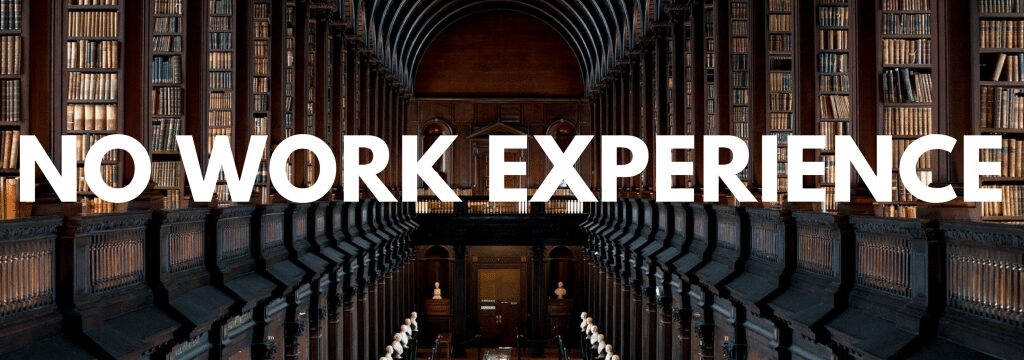
Welcome to MetroMBA’s MBA Without Work Experience Guide.
Business school is designed to give students knowledge and frameworks that they can apply to real-world professional situations. Because of this, many MBA programs require that applicants have a certain amount of full-time work experience before they enroll in graduate school. The reasoning is it’s easier for students to grasp and integrate the concepts they’ll learn in b-school if they have some firsthand experience as context.
If you’re interested in earning an MBA without work experience under your belt, there is some good news. While schools may strongly prefer applicants with established professional experience, some will accept those without full-time work histories – if they show promise in other areas of their applications.
Below is a list of schools that accept MBA applicants without experience. These programs may accept students with internship experience, community service hours, or high academic performance.
Applicants are encouraged to contact their preferred programs to ensure that no requirements have changed.
Top MBA Programs Without Work Experience Requirements
 University of Washington: The Foster School of Business’s full-time MBA.
University of Washington: The Foster School of Business’s full-time MBA.
 Stanford University: The Graduate School of Business at Stanford University does not require full-time MBA applicants to have professional experience.
Stanford University: The Graduate School of Business at Stanford University does not require full-time MBA applicants to have professional experience.
 New York University: The Stern School of Business full-time MBA program does not require experience. However, two years is strongly preferred.
New York University: The Stern School of Business full-time MBA program does not require experience. However, two years is strongly preferred.
 Yale School of Management: Full-time MBA applicants are not required to have work experience.
Yale School of Management: Full-time MBA applicants are not required to have work experience.
MBA Programs That Don’t Require Work Experience
Atlanta
Georgia Institute of Technology: The Scheller College of Business does not require experience for its full-time and evening MBA program. However, the admissions committee prefers that full-time applicants have at least two or three years of experience.
Mercer University: There is no professional history requirement for the full-time or evening MBA programs; though, the average professional experience for full-time MBA students is three years.
Baltimore
Loyola University at Maryland: The Sellinger School of Business’ full-time MBA program does not require work experience.
Salisbury University: Professional experience is not required for its full-time and online MBA program at Salisbury University’s Perdue School of Business.
University of Baltimore: Work experience is not a requirement for admission to either its full-time or part-time MBA programs. However, the majority of accepted students are full-time working professionals with an average of five years of professional experience.
University of Maryland: The R.H. Smith School of Business does not require full-time, online, and part-time MBA applicants to have work experience to gain admission.
Boston
Babson College: Applicants to the F.W. Olin Graduate School of Business don’t need previous professional history to apply for its MBA programs.
Boston College: The Carroll School of Management full-time and part-time MBA programs do not explicitly require work experience, but the admissions committee prefers to see at least two years of experience on an applicant’s resume.
Boston University: The Questrom School of Business’ full-time MBA program does not require work experience for admission.
Dartmouth College: Work experience is not required for admittance into the full-time MBA program at the Darden School of Business.
Northeastern University: The admission committee does not mention any work experience requirement for its full-time and part-time MBA program.
Chicago
DePaul University: Kellstadt Graduate School of Business’ full-time, evening, and weekend MBA program does not require work experience.
Notre Dame University: The Mendoza College of Business does not require work experience for full-time MBA applicants.
Northern Illinois University: Online MBA applicants are not required to have professional history to gain admission into the College of Business.
Loyola University: The full-time and part-time MBA programs at the Quinlan School of Business do not require work experience as part of its admission process.
Dallas
Baylor University: The Hankamer School of Business does not require work experience for admission into its full-time MBA program.
Texas Christian University: The Neeley School of Business does not mention professional history for admission into its full-time MBA program.
Southern Methodist University: Full-time and online MBA applicants to the Cox School of Business are not required to have work experience; however, two years of experience is strongly preferred for full-time applicants.
University of Dallas: Prospective clients to the MBA program at the University of Dallas Satish and Yasmin Gupta College of Business are not required to submit work experience.
University of North Texas: The University of North Texas’ College of Business does not require professional history to gain admission into its full-time MBA program.
University of Texas: Applicants are not required to have work experience to get accepted into the Naveen Jindal School of Management’s full-time MBA program.
Denver
University of Colorado: The MBA admissions process at the Denver Business School does not require full-time applicants to have professional history
Houston
Texas A&M Commerce: The College of Business at Texas A&M does not ask for work experience from full-time MBA applicants.
Texas A&M University: The MBA admissions at the Mays School of Business does not require professional history for full-time applicants.
Texas Southern University: Full-time MBA applicants are not required to have work experience to gain admission into the Jesse H. Jones School of Business.
University of Houston: Applicants are not required to have work experience to get accepted into the C.T. Bauer College of Business’ full-time and part-time MBA program.
University of Houston (Downtown): At the University of Houston, students can receive an MBA with no experience. Applicants are not required to have work experience to get accepted into the Davies College of Business’ full-time MBA program.
University of St. Thomas: Part-time MBA applicants are not required to have professional history to gain admission into the Cameron School of Business.
Rice University: The Jones Graduate School of Business’ admission committee does not require full-time and online MBA applicants to have work experience.
Indianapolis
Indiana University: The admission committee does not require work experience to gain admittance into the full-time or online MBA program at the Kelley School of Business.
Ohio State University: The MBA admissions process at the Fisher College of Business does not require full-time applicants to have previous professional experience to gain admittance into the program.
Purdue University: The Krannert School of Management’s admission committee does not ask applicants to have previous work for the weekend and full-time MBA program.
London
London Business School: The London Business School does require work experience. However, full-time MBA applicants with less than two years of work experience are welcome to apply, if they can prove superior academic credentials and outstanding evidence of leadership.
Los Angeles
California State University: Work experience is not a requirement to gain admittance into the part-time MBA program at the David Nazarian College of Business and Economics.
Claremont Graduate University: The Peter F. Drucker and Masatoshi Ito Graduate School admission committee has no work requirement for its full-time and part-time MBA program. However, the committee strongly prefers that applicants have at least three years of work experience.
Loyola Marymount University: The admission committee does not ask full-time MBA applicants to provide professional history. Yet, two years is strongly preferred.
Mount Saint Mary’s University: The admission committee does not ask weekend MBA applicants to provide work experience.
University of California (Irvine): The Paul Merage School of Business’s full-time MBA program has no work experience requirement.
UCLA: The Anderson School of Management’s full-time MBA program does not require work experience.
Miami
Dayton University: The online MBA program at Dayton University has no work experience requirement.
Florida State University: The online and part-time MBA program at FSU does not require work experience to gain admittance.
University of South Florida: The Muma College of Business does not require work experience to gain admittance into the online and full-time MBA program. However, most accepted full-time MBA students have at least five years of experience.
Minneapolis
University of Minnesota: At the Carlson School of Management, the admission committee does not ask for full-time MBA applicants to submit a previous work history with their application.
Nashville
Vanderbilt University: The full-time MBA program at the Owen Graduate School of Management does not require applicants to have a previous work history. However, most accepted students have at least two years.
New York City
Cornell: The SC Johnson College of Business does not require full-time MBA applicants to have work experience.
Columbia Business School: Work experience is not mentioned in the admission requirements for full-time MBA applicants.
Fordham University: The Gabelli School of Business’ full-time MBA program does not require work experience.
Hofstra University: The Zarb School of Business full-time MBA program does not ask for previous professional experience with an application.
Metropolitan College of New York: The admission committee does not ask full-time MBA applicants for previous professional experience with an application.
Pace University: The Lubin School of Business’ full-time MBA program does not require work experience.
Rutgers Business School: Full-time MBA applicants are not required to have work experience.
Sacred Heart University: The Jack Welch College of Business’ full-time MBA program does not require applicants to have work experience.
St. John’s University: The Tobin College of Business’ admission committee does not require full-time MBA applicants to have professional history. However, two years is strongly preferred.
Stevens Institute of Technology: Stevens Institute of Technology School of Business’ full-time MBA program does not require work history.
Syracuse University: Work experience is not completely required to apply to the full-time MBA program at the Whitman School of Management. However, the admission committee does prefer that applicants have at least two years of experience.
University of Rochester: The Simon Business School does not require full-time MBA applicants to have work experience to gain admission.
Philadelphia
Drexel University: LeBow College of Business’ admission committee does not ask full-time and online MBA applicants to have previous work experience.
La Salle University: The full-time and online MBA program does not require applicants to have professional history to gain admission into the School of Business.
Rowan University: The full-time and online MBA program does not require applicants to have professional history to gain admission into the Rohrer College of Business.
Villanova University: The admission committee does not require online MBA applicants to have professional history to gain admittance in the School of Business.
Widener University: The admission committee does not require online MBA applicants to have professional history to gain admittance in the School of Business.
Phoenix
Arizona State University: ASU has no professional history requirement for the online and full-time MBA program. Yet, the admission committee does strongly prefer that candidates have at least three years of experience before applying to the full-time program.
University of Arizona: The full-time MBA admissions process at the University of Arizona does not require any work experience.
Pittsburgh
Penn State: The admission committee does not require full-time and online MBA applicants to have professional history to gain admittance in the Smeal College of Business.
Robert Morris University: The admission committee does not require full-time applicants to have work experience to gain admittance.
University of Pittsburgh: The Katz Graduate School of Business full-time MBA applicants do not have to have prior professional history. Yet, it is highly suggested for prospective applicants.
Research Triangle
NC State: The full-time MBA program at the Poole College of Management does not require applicants to have previous work exp.
University of North Carolina: The admission committee does not ask for previous work experience for the full-time MBA program at the Kenan-Flagler Business School.
Saint Louis
Washington University: The admission committee does not ask for previous work experience for the full-time MBA program at the Olin Business School.
San Antonio
Schreiner University: Work experience is not required to be admitted to the Online MBA.
San Diego
California International Business University (CIBU): CIBU does not require full-time MBA applicants to have work ex for admittance.
Point Loma University: Fermanian School of Business’ full-time MBA applicants do not have to have prior professional history.
San Diego State University: The full-time and part-time MBA program at SDSU is an MBA program that does not require work experience. However, the admission committee strongly prefers students with at least two years of experience.
UC San Diego: Rady School of Management’s full-time MBA applicants are not required to have prior work experience.
San Francisco
Golden Gate University: The Edward S. Ageno School of Business does not require professional experience for the full-time MBA program.
Chapman University: The admission committee does not ask for previous professional history for the full-time MBA program at the Argyros School of Business.
Santa Clara University: The Leavey School of Business does not require professional experience for the evening MBA program.
San Jose State University: The part-time MBA at the Lucas Graduate School of Business does not ask applicants to have a previous work history.
UC Davis: UC Davis Graduate School of Management full-time and part-time MBA applicants do not need to have professional experience to gain admittance.
University of San Francisco: Work experience is not required for full-time and part-time MBA applicants to get admitted into the School of Management.
Seattle
Seattle University: Professional history is not required for full-time MBA applicants to get admitted into Albers School of Business and Economics.
Toronto
Queen’s University: The full-time MBA program at the Smith School of Business does not require professional history.
University of Toronto: The Rotman School of Management’s full-time and evening MBA program does not require applicants to have previous professional history.
Washington DC
American University: The online MBA program.
Georgetown University: Full-time MBA
George Washington University: The online MBA
University of Virginia: The Darden School of Business’ full-time MBA
Virginia Tech: The evening MBA
 Loading Programs
Loading Programs
Meet Leading Admissions Directors, Clear Admit Editor-in-Chief at Upcoming Events in San Francisco, DC
Admissions directors from seven leading business schools will convene for two upcoming multi-school MBA admissions events, one next week in San Francisco and a second the following week in Washington, DC. Moderated by Clear Admit Editor-in-Chief Jeanette Brown, each event will feature representatives from Berkeley’s Haas School of Business, Cornell’s S.C. Johnson Graduate School of Management, Duke’s Fuqua School, Michigan’s Ross School, NYU Stern School, UVA’s Darden School, and Yale School of Management (SOM).

As part of these unscripted discussions, admissions directors will share tips not available on the schools’ websites as they answer hard-hitting questions designed to give attendees a head start on the application process. Applicants themselves will have an opportunity to pose their own questions both as part of a Q&A session at the end of the moderated panel discussion, as well as during an hour-long admissions fair that will take place during the second hour of each event. During the admissions fair, alumni from participating schools will also be present to answer questions about student life and the culture at each school.
The first event will take place at the San Francisco Omni Hotel, located at 500 California Street, on Thursday, May 10th, from 7 to 9 p.m. The second will take place at the Renaissance Washington, DC Downtown Hotel, located at 999 9th Street, NW, on Wednesday, May 16th, also from 7 to 9 p.m. The doors will open at 6:30 p.m. for each event, and attendees are encouraged to arrive early for registration and informal mingling with admissions directors and alumni from the participating schools.
These events are open to anyone looking to apply to or enroll in an MBA program, especially the full-time programs at the host schools. Both events are free, but advance registration is requested. To register for the San Francisco event, click here. To register for the DC event, click here.
Don’t miss this great opportunity to learn firsthand about seven leading business schools in a single evening. Walk away with a firm understanding of the general MBA application process and increased confidence in your approach, having gotten to know admissions personnel and alumni from each of the host schools.
Forbes Best Business School Ranking (United States)

Forbes's biennial Best Business School ranking is broken up into two separate lists, analyzing graduate schools in the U.S. and abroad. The lists take into account the average financial gain MBA graduates accumulate five years after graduation, how long it takes to fund the degree, and the average pre-MBA and post-MBA salary growth. Take a look at the publication's top U.S. business schools in 2019 below.
Why McKinsey & Company Loves Hiring MBAs
McKinsey & Company is considered one of the most prestigious management consultancy firms in the world, with a clientele that includes 80 percent of the world’s largest corporations, along with an extensive list of governments and non-profit organisations. The firm is also a prestigious landing spot for MBAs following graduation. Continue reading…
The Economist Full-Time MBA Ranking


The Economist's annual full-time MBA ranking measures the salaries of graduates, GMAT averages, and the amount of registered alumni, as well as survey data. Take a look at the publication's 2019 top 100 full-time MBA programs below.
How Can You Get a Job at Boston Consulting Group in 2018?
Boston Consulting Company—a global management consulting firm— has offices across more than 90 cities and 50 countries, advising clients in the private, public, and not-for-profit sectors, including a healthy chunk of Fortune 500 companies. Considered one of the most prestigious management consulting firms in the world, BCG was ranked fourth in Fortune’s “100 Best Companies to Work For” in 2018.
But, how can an MBA help you land a BCG job?
Working for BCG
According to Management Consulted, BCG has a demanding recruiting and hiring system. The firm hires undergrads as associates who work for two to three years before moving on or pursuing an MBA. However, it is very difficult and highly unlikely for an associate to make the leap to consultant without an MBA. If you’re hired as an MBA, you enter as a consultant with plenty of room for growth—to project team leader, principal, and then, finally, as a partner partner.
According to former BCG senior partner Lucy Brady, the company looks for a candidate’s record of academic and professional success, but also want to hire candidates who have overcome setbacks.
“We look for resiliency and adaptability, and the ability to learn from your mistakes and grow from them,” she said in a previous interview.
CNN revealed that 11.72 percent of MBAs want to work for BCG. However, BCG’s recruiting process is demanding, with Glassdoor previously ranking the firm among the most difficult companies to interview with.
The high job demand and lengthy interview process isn’t without reason: MBAs typically thrive at BCG due to the companies the emphasis on career development. BCG’s PTO (predictability, teaming, and open communication) policies allow for a healthy work-life balance for employees, which has paid numerous dividends. Internal surveys have shown that the program has led to a 74 percent increase in reported intentions to stay with the company for the long term. BCG was also among the companies that signed the 2016 White House Equal Pay Pledge.
BCG Recruiting on Campus
BCG actively recruits students on college and university campuses around the world. Campus visits are a way for students to connect with BCG, learn more about potential job opportunities, and feel out whether a career at BCG is a good fit.
“We have a presence at many of the top universities across the U.S., including Harvard, Stanford, the University of Pennsylvania, Northwestern, University of Michigan, Duke, and the University of Texas,” Tina Gao, BCG recruiting director, said in a previous interview. “We come to campus and hold a presentation to introduce the company and then are available for Q&A sessions. We also come back to help people train for our interviews and learn more about the company. We’ll come back to campus to interview the candidates we choose.”
You can see more upcoming BCG on campus events here. However, if your campus does not have a dedicated page, BCG encourage students to complete an online application for consulting internships.
BCG Internships
BCG’s consulting internship programs can be a great opportunity for students to get a feel for the the life of a consultant. BCG Associate and Consultant interns work with current BCG consultants, and are expected to contribute to a real client project. Interns are considered as true case team members and are tasked with everything from working on client projects to socializing with colleagues.
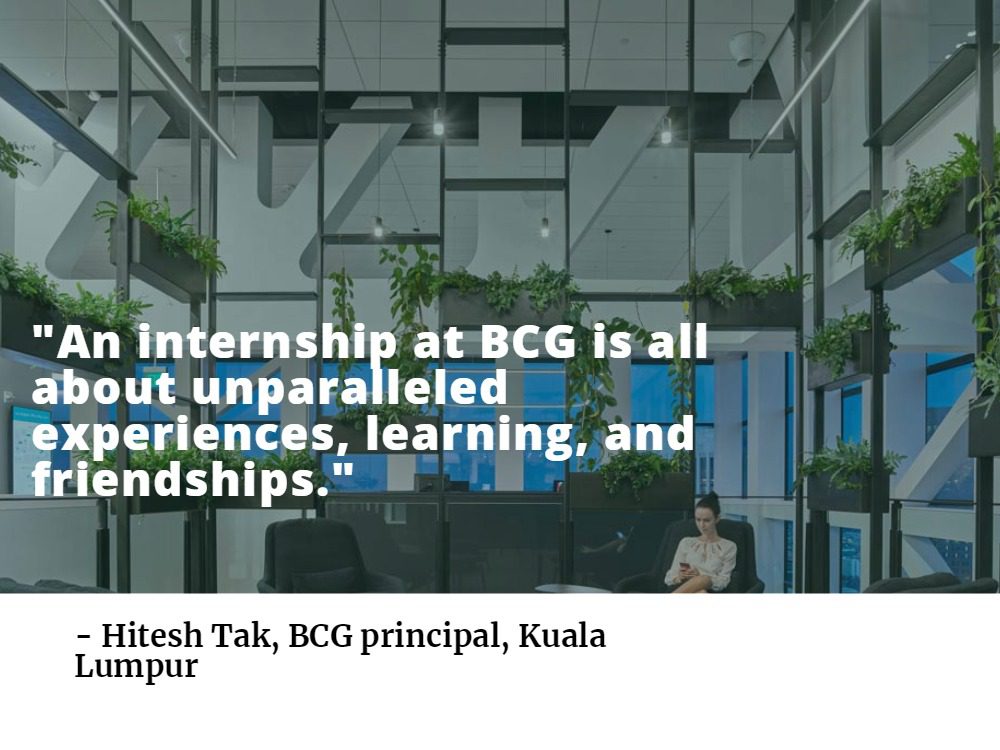

According to BCG, internships vary depending on the project or location. Some interns are expected to travel, but do return to their home offices at the end of each week for special events and social activities. Orientation and training sessions ease interns int their roles before being assigned to a case that aligns with their personal and professional goals, as well as the firm’s business needs.
BCG accepts online applications from exceptional business school, engineering, science, law, and humanities students who are nearing the completion of their undergraduate or graduate studies.
BCG MBA Fellows
If you’re an MBA who wants to get your foot in the door at BCG, it’s worth looking into the BCG Fellows MBA Program, which provides top applicants with monetary awards and individual mentorship by BCG consultants.
The fellow program is only available to full-time MBAs studying at the following business programs: Columbia Business School, Fuqua School of Business, Kellogg School of Management, Harvard Business School, MIT Sloan School of Management, Stanford Graduate School of Business, Stern School of Business, Tuck School of Business, Anderson School of Management, Booth School of Business, Ross School of Business, Darden School of Business, The Wharton School and Yale School of Management.
BCG MBA Salaries
If you score a job at BCG, you’ll also be earning a big paycheck—well worth the hours of MBA studies and the rigorous recruiting process. According to Management Consulted, MBAs hired a BCG make earn the following within their first year of employment:
- Signing Bonus: Up to $30,000
- Base: $147,000
- Relocation: $2,000-8,000
- Performance Bonus: up to $44,100
- Retirement: Profit-sharing into a 401k




